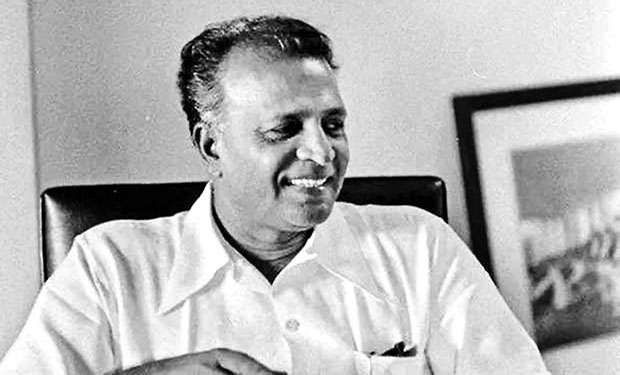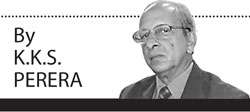Reply To:
Name - Reply Comment
Last Updated : 2024-04-19 06:03:00

sovereignty of people should be delegated from time to time to representatives chosen by the people
 “The Anglo-Saxon Parliamentary system and the American Presidential system are two alternative forms of government. The two cannot be mixed and the hotchpotch that he has presented is not workable” – NM
“The Anglo-Saxon Parliamentary system and the American Presidential system are two alternative forms of government. The two cannot be mixed and the hotchpotch that he has presented is not workable” – NM
Nanayakkarapathirage Martin Perera joined the London School of Economics and University of London in 1927 as a student of the legendary Professor Harold Laski.
Being awarded his first doctorate for his thesis on ‘The Constitution of the German Weimar Republic,’ he was invited to read for a second thesis on ‘A further comparative study of the Constitutions of the UK, United States, France and Germany,’ which won him a DSc. When the current Constitution was established in 1978 by JRJ, NM his contemporary at University College was out of Parliament though, authored, ‘Critical Analysis of the New Constitution of the Sri Lanka [1978]’ scrutinising the document and revealing the ill effects of it.
Addressing a seminar on the proposed JRJ Constitution, NM said, “The fact that the President has the authority to assign to himself any topic or function which he desires to take over, he can at will reduce or remove any function already agreed to the PM or to any other minister. In these complicated circumstances, what happens to the left majority in the House supporting a left Prime Minister who is saddled with a President sponsoring an opposite policy in conflict with the declared policy of a majority in the Parliament? How is this conflict to be resolved? Will that President be prepared to swallow his pride and foreswear his convictions adumbrated in his own declared policy when he assumed office? If neither is prepared to give way, there will be a deadlock. The whole governmental machinery will come to a standstill.”
Writing on the 1978 Constitution, he says, “The manner in which this Bill has been rushed through Parliament makes us a little suspicious. What is there so urgent about amending a Constitution? After all, Constitutional Amendments are potent not for a year or two but for all time.” He continued, “I can think of no country with a written Constitution that enables Constitutional amendments to be carried through in the headlong manner that he has done. Most Constitutional amendments take years to fructify and some countries provide even for a referendum before such an amendment is made effective. There may be many in this country who hold different views on the Presidential system of government. Why should they be deprived of the right to express their different viewpoints to the legislature and to the people of the country and urge that full consideration and weight be given to their views?”
“This statement of the Prime Minister is tantamount to a rejection of Parliamentary government for developing countries. It is necessary to remind him that this is the basis on which most of the newly-independent countries in the continent of Africa have proceeded. Kenya, Tanzania, Zambia, Uganda, Nigeria, Zaire, Malawi and so forth have plunged for one party rule. They have emasculated the whole conception of Parliamentary democracy on the ground that developing countries need stable governments to carry out the task of economic development,”
NM emphasised.
“The nett result of this one party rule and the stamping out of opposition in terms of political degeneracy, economic mismanagement and downright corruption has to be seen to be believed. Tribal rivalries have rendered this intolerable situation inevitable. Does not J.R. Jayewardene by implication express this sub-conscious preference for a one party dictatorship in Sri Lanka?” NM questioned.
Probing the history of the Presidential form of government, NM said, “The founding fathers of the American Constitution devised a system under which they thought the party system could not take root or flourish. So they hammered out the institutions of government with the deliberate aim of discouraging parties and they fondly believed that the President with executive powers can achieve this objective. They were also misled into accepting the wrongly-conceived Montesquion dictum.”
Montesquieu, the French philosopher (1689/1755) who campaigned for the separation of executive, legislative and judicial powers according to him, misunderstood the working of the British system and wrongly attributed the success of that system to a separation of the three key powers, and that actually, there was no such separation. The executive was part of the legislature and most of the superior judges were appointed by the executive. NM believed any kind of strict compartmentalising was not conceivable and, proceeding on this wrong theory, founders of the American Constitution separated the legislature and the executive completely. As he enlightened us, neither the President nor the Cabinet were members of the legislature. Except for conveying a memorandum to the congress he had no place in the legislature at all.
The assassination of Bandaranaike threw the whole country into a period of uncertainty and bewilderment and instability in 1959, but recovered satisfactorily to give a clear mandate to Sirimavo in July 1960. JRJ ousted her government before its time by dubious scheme; used a few SLFP MPs and engineered a defeat of the government in 1964.
Dr. N.M. Perera questioned, “In the face of this familiarity, why are we floating merrily to embrace an unfamiliar Constitutional form? The experience of other countries bashed about by the countless snags in the Presidential form, we would be stupid to ignore. Coup d’etat has followed coups in these countries. And stagnation and poverty have been the hapless heritage of the masses in these states. Are we blindly to get into this doubtful gamble and throw away fifty years of Parliamentary democracy, which with all its flaws have offered a measure of steadiness and progress? We have certainly shunned the violent disorder that other Presidential system practised states, except the US, have witnessed...”
He said, “The President will preside over the meetings of the Cabinet. The PM and the Cabinet are appointed by him. JR has taken the safety measure of stating that he must decide as PM one who he thinks commands a majority in the House.”
Commenting on JR’s idea of creating an Executive Presidency, “The Constitution of a country must have checks and balances if it were to function properly taking into account the diversities in the country eventuating in the highest common factor of agreement. There can be fair time lag between the elections for the two establishments. One can, therefore, imagine a situation where two diverse political characters can prevail in the two bodies. A left-of the centre Parliament can well confront a right-inclined President. This can be the beginning of a continuing and unceasing conflict. The President appoints the PM from among the members. He will choose one who he thinks commands a majority in the House. With a left majority in the House, he will be obliged to choose a left Prime Minister.”
Discussing a future conflict, he said, “A two-thirds majority against the President can remove him. This is unlikely in the future if the PR system is brought into existence. If the Parliament is having a majority against the President, it can refuse to pass money to carry out the administration and the President in turn would turn down to endorse as law any actions passed by Parliament. A disillusioned and aggravated population will make short shrift of Parliament. It can well be the preclude to a Fascist government. Is this what we are slowly inching towards?”
Dr.N.M.continued, “If neither party is prepared to yield ground, the Constitution might as well be scrapped. It will be unworkable. The whole country sick of Parliamentary democracy will turn to alternative forms of government such as Fascism. It is a pity that JR has ceased to think of the future. The present Parliament may well shun the kind of deadlock that I have prognosticated but the next Parliament will not. We would be guilty of an unforgivable crime if in fashioning a Constitution for this country we become obsessed by the advantages we can reap by the present concatenation of favourable circumstances. It is wrong to presume that the antagonism between the President and Parliament will spring only from the political complexions of the two bodies diverge. This is not the experience of the United States where the Presidential system continues to function albeit with cracks and groans. The tendency over the years is for the legislature to become suspicious of the power welded by the President and his entourage.”
Concluding Dr. N.M. Perera asked, “Who is to prevail finally and which policy is to prevail? These are unresolvable problems which will end in the discrediting of democracy itself. As I have adverted earlier on this hotchpotch of a Constitution will not work.” JR was wrong in his assertion that the Constitution he has introduced does not influence the sovereignty of the people. It is only partially true. This new Constitution will erode into the sovereignty of the people. The sovereignty of the people cannot be distributed through a number of institutions. Section 4 of the 1972 Constitution emphatically states: “The sovereignty of the people is exercised through Parliament of elected representatives of the people.” The sovereignty of the people should be delegated from time to time to representatives chosen by the people.
We can only hope that, wiser counsel will prevail. And Constitutional amendments should be made the subject of more long-drawn-out and profounder deliberations.
The writer can be contacted at - kksperera1@gmail.com

Add comment
Comments will be edited (grammar, spelling and slang) and authorized at the discretion of Daily Mirror online. The website also has the right not to publish selected comments.
Reply To:
Name - Reply Comment
On March 26, a couple arriving from Thailand was arrested with 88 live animal
According to villagers from Naula-Moragolla out of 105 families 80 can afford
Is the situation in Sri Lanka so grim that locals harbour hope that they coul
A recent post on social media revealed that three purple-faced langurs near t